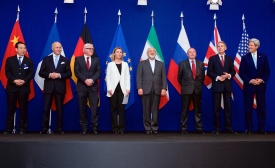p5+1
Iran's approach to foreign policy changed dramatically after Hassan Rouhani was elected President of Iran in 2013. The most serious and comprehensive negotiations regarding Iran’s nuclear program started in 2013 between Iran and six world powers including the United States. An interim agreement was reached on November 24, 2013. A framework agreement was reached on April 2, 2015. And finally, the comprehensive deal was reached on July 14, 2015 to ensure that Iran’s potential pathway to developing a nuclear weapon is blocked.

Iran’s public diplomacy has long been geared toward selling a possible deal to hard-liners at home. [...] the government seemed to recognize the need to prove that it had done all it could to obtain a final agreement.
Last week, the entire world watched the United States Congress giving the Prime Minister of Israel, Benjamin Netanyahu, a fervent round of applause with 26 standing ovations. While almost all major world powers criticize Netanyahu’s position against nuclear negotiations with Iran, the U.S. Congress embraced it with open arms. What message does this send to the rest of the world?
Dear Iranian Negotiators: Some of you may remember me from the time I served on the American delegation to the nuclear talks. Although I left the U.S. Government over a year ago, I try to follow the negotiations closely, and I have been impressed by the determination and professionalism that you – as well as the Americans and indeed all the parties – have brought to the table.
In less than a week, representatives from Iran and the P5+1 (Britain, China, France, Russia, the U.S. plus Germany) will convene in Vienna to discuss ways for Iran to give verifiable guarantees of the solely peaceful nature of its nuclear program.
After the recent deal on Iran's nuclear program was concluded, Catherine Ashton, who is in charge of EU's foreign policy, was commended for her constructive role as coordinator and moderator of the tough negotiations between Iran and the five permanent members of the UN Security Council plus Germany. According to many observers, Ashton's performance had kept Brussels in the game and that is quite an achievement for someone who has to conduct policy on behalf of 28 EU member states with often fundamentally different objectives.
“We are not blind, and I don’t think we are stupid,” said U.S. Secretary of State John Kerry in response to fierce Israeli criticism after the first round of talks about Iran’s nuclear program earlier this month failed to reach a deal. Now the deal is done, and Israeli Prime Minister Benjamin Netanyahu is even harsher in his condemnation of Kerry’s handiwork.







